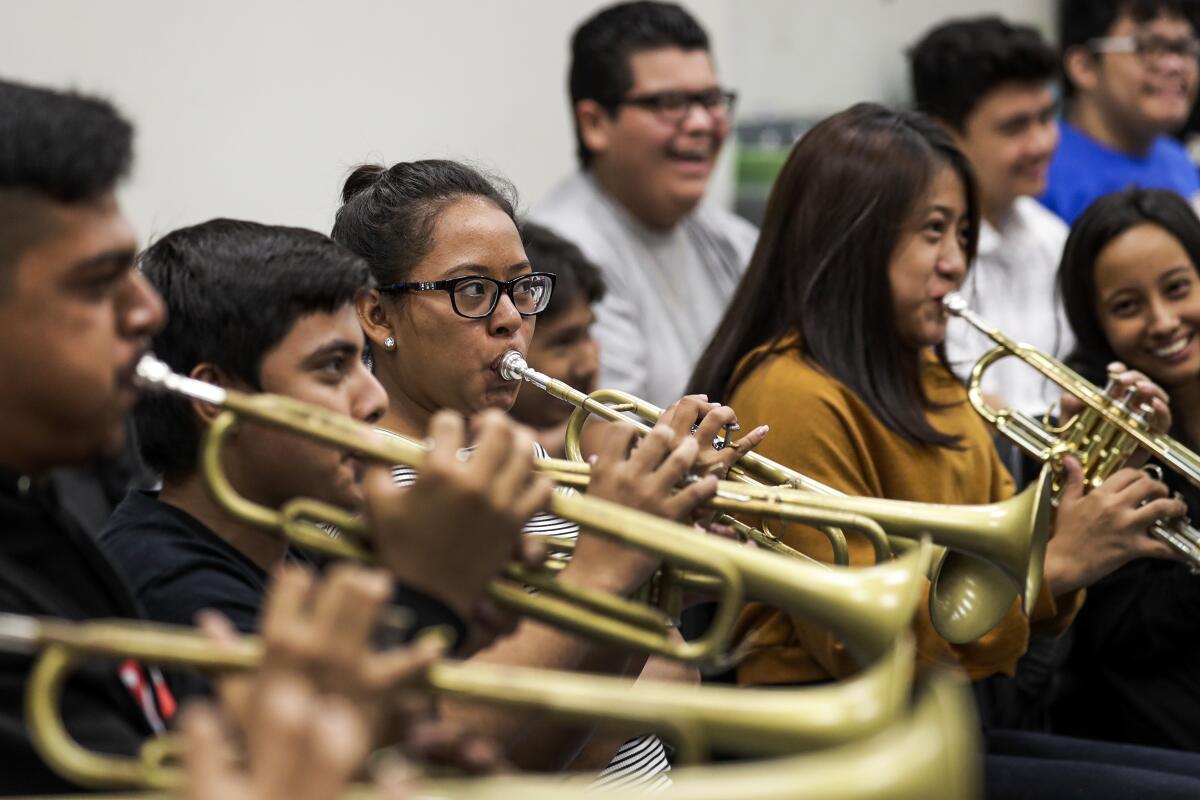Dr. Dre, will.i.am, Issa Rae give early ‘yes’ to proposed school arts initiative

Depleted public schools arts programs would get a huge boost under a proposed statewide ballot initiative put together by former L.A. schools Supt. Austin Beutner — with A-list endorsements from entertainment and music industry figures including Dr. Dre, Jimmy Iovine, will.i.am, and Issa Rae.
The initiative, if it gets on the ballot and wins voter approval, would raise an estimated $800 million annually to benefit public school students in kindergarten through 12th grade with often limited access to music, drama, and visual arts education. The official filing of “The Arts and Music in Schools — Funding Guarantee and Accountability Act” Monday begins a long process, which includes gathering more than 600,000 signatures by April 26, 2022 to qualify for the November 2022 ballot.
“This ballot measure will help define the promise of the next generation of storytellers by ensuring all California students get the high-quality arts and music education they deserve,” Rae said in a statement. “It will especially benefit students from communities of color.”
The initiative is one of several possible education-related ballot measures, including one supporting public funds for private school tuition rooted in parent anger over the pandemic-related school closures.
Backers predict the arts measure would increase by more than 50% the number of arts and music educators in classrooms. The annual funding would equal 1% of the amount already going to K-12 education under state constitutional guarantees. But instead of coming out of education dollars, the funding would be pulled from the state’s general fund.
That formula means that existing education money would be protected and no tax increase would be necessary. On the other hand, every new dollar for arts education would be a dollar less for a new or existing state program in a different area of need.
“I’m all in on giving kids more access to music and arts education because creativity saved my life,” said musician and producer Dr. Dre, who’s also involved with Iovine in setting up an entrepreneurial program in L.A. Unified.
Schools with students from low-income families would receive an additional share of funds.
While the arts initiative could bring music to many ears, other measures in the works are born of discontent.
Two initiatives would allow parents to take funds used to educate their children in public schools and use that money instead toward private school tuition. The group behind one such measure includes current or former L.A. Unified School District parents who became angry at the length of time that L.A. schools remained closed under Beutner because of the pandemic. Some developed antipathy toward the L.A. teachers union over issues such as an online school day that was shorter than in other major urban districts in California.
The proposals would provide $13,000 to $14,000 annually for years when a child is not attending a public school. The money would be deposited into an education-savings account that a parent could tap to pay for private school or college. The frustrated L.A. Unified parents would phase in their plan first for lower-income families. The second proposal, championed by Michael Alexander of Californians for School Choice, has no income limitations.
A proposed initiative by billionaire entrepreneur Timothy Draper would eliminate collective bargaining rights for teachers, police, nurses, firefighters and other public employees. His 2018 ballot initiative to split California into separate states was removed from the ballot by the state Supreme Court.
Another possible ballot measure would establish a state constitutional right to a “high-quality” public education.
And, lastly, another potential initiative states that public schools would have to provide each teacher and pupil with 30 hours of “healthy Earth sustainability education and best practices training every two years.”
All of the proposed measures are in the early stages of attracting enough signatures of support to make the ballot, part of California’s initiative process, which allows citizens to propose laws and constitutional amendments without the governor or Legislature.
Since leaving L.A. Unified, Beutner has been mentioned as a possible candidate for public office. He declined to discuss future plans beyond the scope of the arts initiative.
He recounted that, as a shy child whose family moved frequently, his life changed immeasurably for the better when an elementary school music teacher steered him to the cello.
Three years leading L.A. Unified — through last June — reinforced his belief in arts education.
“When students had a chance to participate in the arts, you saw their engagement, you saw their smiles,” said Beutner, who stepped down at the end of contract. “I also saw first-hand the lack of access to the arts in so many of our schools.”
At least 80% of funds would have to be used to employ those providing arts education, with nearly all the remainder for training, supplies and materials.
Qualified arts programs would include: dance, theater, music, folk art, creative writing, painting, sculpture, photography, design, graphic arts, computer coding, animation, costume design, film and video.











